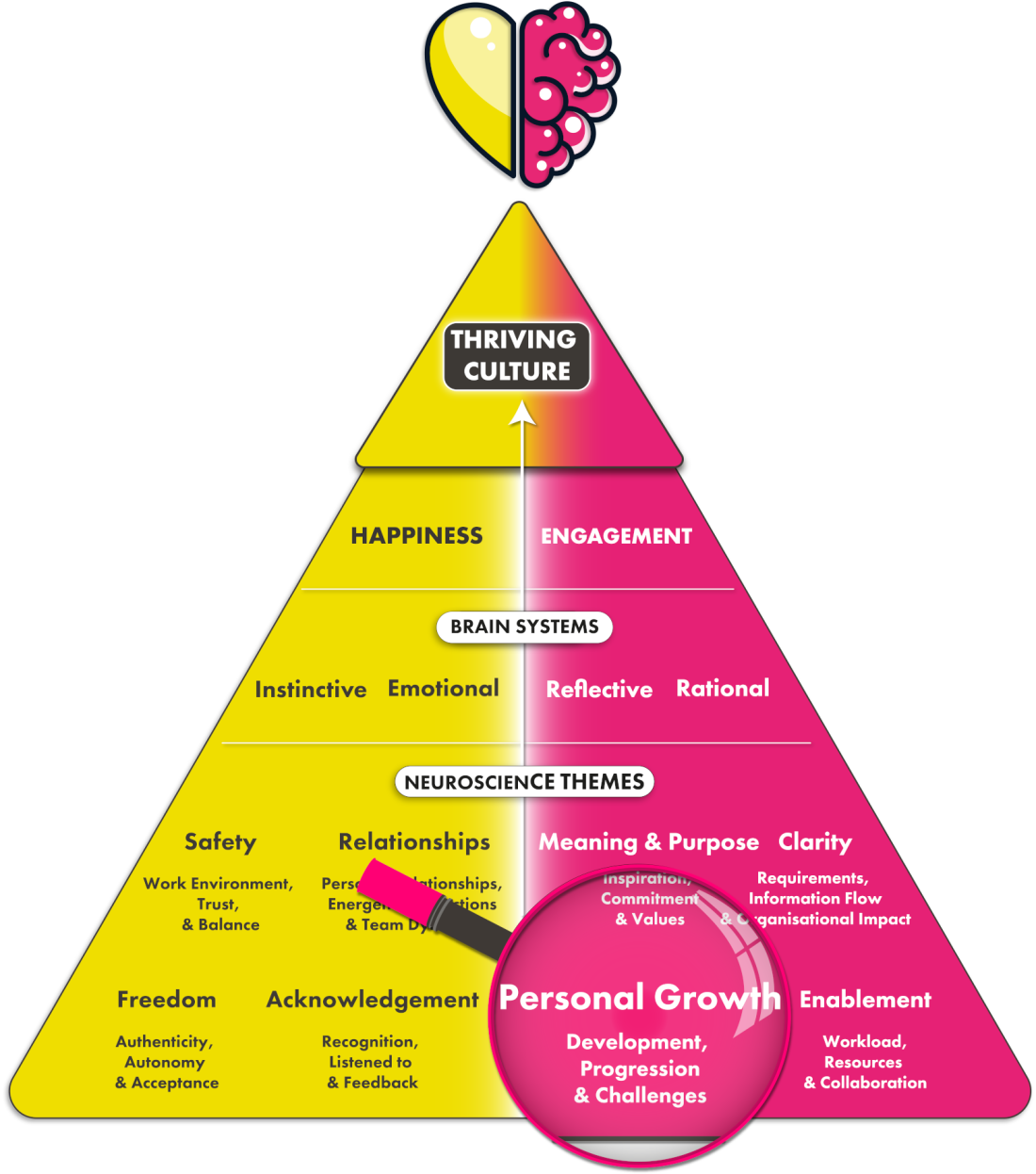Menu


Engagement in the workplace can be linked with the level of personal growth a person can access within the organisation. Personal growth is associated with the Reflective brain system in our neuroscience model.
If you’ve just landed here, we recommend heading over to our brain systems and neuroscience themes pages for a clearer understanding of our neuroscience model and why we’re drilling down into this area. Otherwise, read on to find out how employee engagement can be driven by personal growth.

Being engaged at work means finding purpose in your role, but it also relates to the level of personal growth you can access with the organisation. It’s more than just growing in your job; it’s growing as a human being.

In marriage, you may have to fall in love again every four or five years because you’re not the same people you were when you started the relationship. That’s a commitment in growing together. It’s the same for the workplace – every two or three years, you must push yourself to grow and fall in love with your work again.
People get stale in their work and stay within their comfort zones. Doing the same job for too long builds up resentment – it becomes less meaningful and purposeful because there is no push to grow beyond the boundaries. Every two to three years, ask yourself ‘who’s the person I want to be in five or ten years? What’s the next thing that scares me that I could be doing?’ That’s a stepping stone towards falling in love again with your day-to-day work.
Understanding who you want to be is important, but thinking about this strictly from a career perspective is problematic. For instance, you might have a goal of becoming a physician, but what’s beyond that? Successful people think more broadly and holistically. They consider who they want to be, what they need to become that person and what role their career plays in enabling that vision to come to reality.
The best companies are less cautious around offering people space to stretch. When doing an executive search, companies often want to hire someone who, on paper, is perfect (but probably doesn’t truly exist). In comparison, the smart hire will be someone with 60% of the job requirements and 40% to grow rather than hiring one that has 100% of the requirements.
We are now moving to an ecosystem model of work whereby an organisation offers an environment for people to plug into in several ways in order to grow, learn and progress in a way that suits them. This includes external suppliers and partners plugging into their people ecosystem at different points, which is much more fluid.
When your organisation asks for volunteers, do you raise your hand? Doing so gives you exposure, which can lead to progression or personal growth. The more you put yourself in a position to welcome new opportunities, the more doors you open.
Most leaders are open to ideas. If you spot opportunities where you can add value, put a business case together and take it to leadership. Most people will give consideration and even if they don’t sign off, you’ll anchor in their minds that you’re someone looking for more scope and growth. You’ll show a propensity of moving forward and a desire to take on new things.
Self-awareness exercises are essential. Look at various confidence-boosting exercises, particularly during times of transition. Take references on yourself, go to previous bosses and colleagues, asking ‘what did I do well? What needed improvement? What would you point me towards if you were to employ me again? What advice would you give to someone managing me?’
This exercise will remind you of the great stuff you’ve done in the past and how far you’ve grown. This should remind you that growth is possible because the evidence is right in front of you. You can also discover a superpower you didn’t know you possessed. Having senior people play that back to you is fantastic for giving you the confidence to grow further.
Creating an ecosystem that offers tailored pathways and opportunities is crucial while incentivising the behaviour. Organisations that aren’t just ticking the box but are targeting people to take on growth-based projects are the ones doing it well. Every quarter spend time in reviews and coaching sessions to acknowledge your employees’ willingness to step out of their comfort zones.
People seek these four things as part of their progression. They want to know that their decisions matter, to see the fruits of their labour and their work is impacting leadership. People are craving this more than ever. They want to work for great leaders and expansion is all about learning and growing. Connecting to the head, hearts and wallets of the people who work for you is vital to empower their personal growth.
In the current hiring and talent market, organisations are the candidate. They are being assessed at all points of the employee journey. Employees view roles as a tour of duty rather than a job for life. The average tenure in Europe is predicted to drop below three years. The whole dynamic around employment relationships is changing. Organisations are competing with self-employment. Their hiring initiatives need to be more customer-centric. We’ve been through an employee experience revolution over the last ten years – it’s time to get on board.
Micro management is terrible, but in the new world of work there’s an equally damaging yin to that yang, which is no management at all. Often buried under the guise of empowerment, it rarely helps progress. With employees working remotely leaders think they’re empowering them, but they need to nurture and support them with clarity and vision. We’ve got to invest in their growth.
Many companies are stuck, not realising they’re now the candidate. The middle ground has freedom built within the framework. Freedom (as in empowerment), tailored and personalised programs offer people ownership and responsibility rather than accountability.
Organisations need to understand their people’s visions and be comfortable with them in order to drive personal development. If the employee’s vision doesn’t include being with the company in five years, have an honest conversation about that. If you’re getting more than three years, then you’re above the European average. We need to be more pragmatic about the employment relationship. No matter how people engage with our organisation on that tour of duty for three or four years, we are all better off when we’re aligned.
Within the next 12 months, ask your employees who they will mentor and who’s mentoring them. Often people get assigned mentors, which is positive. But as a mentor to a mentee, you get a load of personal growth, almost as much (if not more) than being mentored.
When personal development is done right with the correct frameworks, the employee can see and feel alignment in who they are and what they do for the company.
*This is an excerpt from the Happiness and Humans Podcast with Andrew MacAskill, CCO at Fraser Dove International.
Related articles
Get in touch for a quick chat with one of our experts to see how we can help you.
Take our benchmark to map where your organisation is now, and where it needs to be.